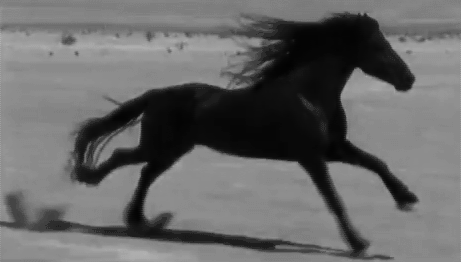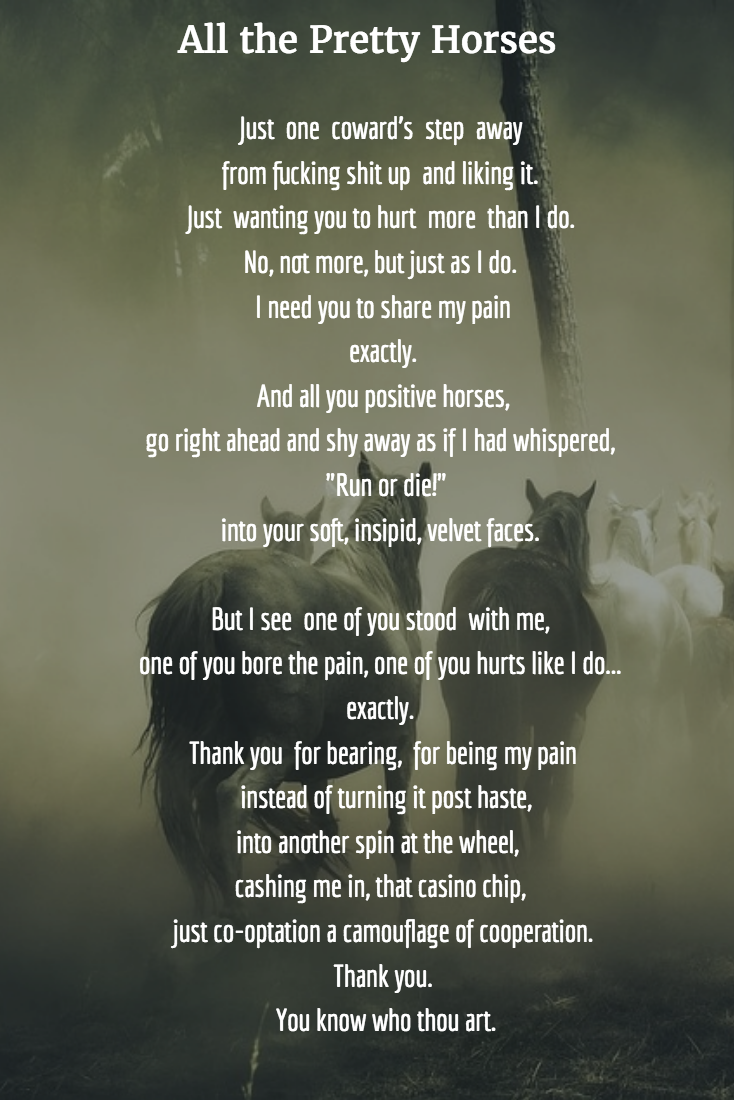Listen to my latest phonecast
morning sights and sounds 6/8/2019
Listen to my latest phonecast
Brother Can You Spare a Dollar’s Worth of Happy
Thought of these two songs as I imagine the year ahead. It is a year that will show us what it means to depend on each other more and more as we all have less and less as the Washington Choir sings the song of kleptocracy and…well, we know not what, eh?
https://www.youtube.com/watch?v=zjZIFTxKHGw
https://www.youtube.com/watch?v=p3KoJj4dz2I
November. Thanksgiving. 8:17 am.
Uncanny Halloween Valley of Robots & Pumpkins
Side-by-side. So weird.
Robot uncanny valley.
Self-carving pumpkin.
Juxtaposition.
Falling and cutting, our minds
a freefall of delight
in horror.
The Tygers of Wrath Are Wiser than the Velvet-Nosed Horses of Instruction

All the Pretty Horses
Just
one
coward’s
step
away
from fucking shit up
and liking it.
Just
wanting you to hurt
more
than I do.
No, not more,
but just as I do.
I need you
to share my pain
exactly.
And all you positive horses,
go right ahead
and shy away
as if I had whispered,
“Run or die!” into your
soft insipid velvet faces.
But I see
one of you stood
with me,
one of you bore the pain,
one of you hurts like I do…
exactly.
Thank you
for bearing,
for being my pain
instead of turning it
post haste
into another
spin at the wheel
and cashing me in
like a casino chip,
Thank you.
You know who thou art.
A slightly different draft:

Anthony Madrid Wonders ‘What Is Poetry For?’
Paris Review Daily has now published two of Anthony Madrid’s quasi-kōan sets, “Both speech and silence are involved in transcendent detachment and subtle wisdom. How can we pass through without error?” (in July) and “I always remember Jiangnan in May; where the partridges call, the hundred flowers are fragrant.” (Right this very second! (ish)) More: Public Case 6: Ancient Chinese Our teacher said: “Has anyone ever noticed that many of the most attractive ancient Chinese poets have the same ideas about poetry as modern American high school students? Anyhow, the themes are the same. What am I doing today. How am I feeling. What’s my philosophy. What can I see from where I’m sitting. What just happened. I am kind of a loser. What are my favorite quotes.” One of the students said: “James Schuyler.” Comment. It is hard for twenty-first-century USA poets to really understand old Chinese poetry: no surprise there. The surprise is that we find our own childhoods as difficult to “relate to” as the literary world of premodern China. We rub our eyes in disbelief when we have anything in common with either. Tao Qian, James Schuyler, our own sixteen-year-old selves—of course they write about what they can see from where they’re sitting. What else can be seen? The truth is almost everyone has almost everything in common. The main exception is the people who are “too smart for that.” They make a point of not having anything in common with anybody. Continue at Paris Review.
iPads are as good as sedatives at calming kids down before operations
Digital Public Library of America » Blog Archive » Back to School at DPLA
What’s on your checklist at the start of this school year?✓ Blank notebooks✓ Sharpened pencils,✓ Free, online ready-to-use education resources? Check! ‘
Source: Digital Public Library of America » Blog Archive » Back to School at DPLA
And this: Primary Source Sets.
And this: Jitterbug and Swing Dance.
And this: Get Connected.
And this: Spread Your Open Resource Wings.
And this: A Map to the DPLA.
Infinite Reciprocation: What to Do with the P22 Music Text Composition Generator
 To George Station in particular and all other infinite gamers out there: here is one of those tools that is delightful but not sure what its function is. What do you do with it?
To George Station in particular and all other infinite gamers out there: here is one of those tools that is delightful but not sure what its function is. What do you do with it?
P22 Music Text Composition Generator
Kevin Hodgson did this with it:
And I musitexted the Bill of Rights here:
So, here is the game I proposed to George Station on Facebook a short time ago and that I propose to you ‘dear reader’–find a use for the damned thing besides the joy of play (which I feel is sufficient).
Use the accompanying Hackpad below to add to it (or use the Google Doc here).



